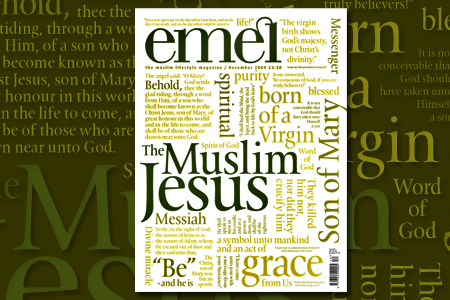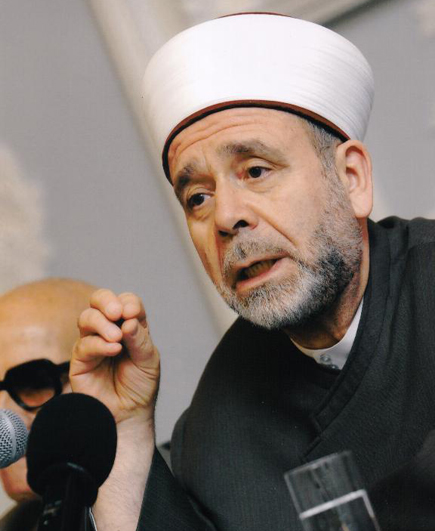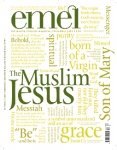
The Muslim Jesus
Issue 63 December 2009
(This article was first published in December 2009 for issue 63)
In a world of divisions, can the man both Muslims and Christians call the Messiah, have the potential to be a bridge? Sarah Joseph explores “The Muslim Jesus”.
Growing up, Jesus was the third person in my life, along with my mother and grandmother. Every night I would pray, “Gentle Jesus, meek and mild, look upon this little child,” before launching into my long list of things I needed help with. There is no doubt I was influenced by Robert Powell’s portrayal of Jesus which I watched when I was six or seven; and I can still vividly remember seeing Ben Hur at the local church hall at about the same age. When the storm comes after the crucifixion, and Ben Hur’s mother and sister are healed of their leprosy, I sat spell bound on those uncomfortable church seats and knew with Jesus in my life I was going to be OK.
Over three decades later, now a Muslim, I still have Jesus in my life. I realise that this confuses many people. Some Muslims think I may have some Christian hangover. Whilst many Christians cannot fathom how I can be a Muslim and still love Jesus. But I do love Jesus, and I could not be a Muslim unless I did.
With Christians and Muslims forming half the world’s population, and with there being so much misunderstanding between these two faiths, could it be possible that Jesus can become a bridge between those that believe in him, despite their differences?
The Muslim understanding of Jesus is simple. He was a man, born of a virgin. He was given prophethood by God from birth and performed miracles during his life by God’s leave. Muslims do not believe in the crucifixion; and the majority orthodox belief is that he did not die and will one day return. In a nutshell, that is it. But there is more.
How is it possible to accept his virgin birth and yet reject him as divine? The Muslims say it begins with Mary, who was dedicated to God from the time she was in the womb. Such was Mary’s grace and piety, she was protected in the temple by God for what was to behold her–a visit by the angel Gabriel with some extraordinary news. The account in the third chapter of the Qur’an is very similar to the account in the gospels. Gabriel says to her, “O Mary! Behold, God sends thee the glad tiding, through a word from Him, of a son who shall become known as the Christ, Jesus son of Mary.” Mary is naturally stunned by this news and wonders, “O my Sustainer! How can I have a son when no man has ever touched me?” Now appears the fundamental difference in the two accounts, for in the Qur’anic narrative the angel answers Mary, “Thus it is: God creates what He wills. When He wills a thing to be, He but says unto it ‘Be’–and it is.” The Muslims say this shows God’s majesty, not Christ’s divinity. Elsewhere in the Qur’an God says that the parable of Jesus’ virgin birth is that of Adam. Adam was of course brought into being without man or woman, purely because God willed it.
Mary returns to her people after the birth, whereupon she is scandalised. She points to her newborn baby and he speaks to the accusers from his cradle, “Behold, I am a servant of God. He has vouchsafed unto me revelation and made me a prophet, and made me blessed wherever I may be; and He has enjoyed upon me prayer and charity as long as I shall live... Hence, peace was upon me on the day I was born, and will be upon me on the day of my death, and on the day when I shall be raised to life again.” (Qur’an: 19:30-33). This is Christ’s first miracle.
From this amazing beginning, Christ grows up to be a noble man. He establishes his mission as an apostle to the Children of Israel. And God’s promise that he would perform other miracles is fulfilled. He heals the blind and the leper, and brings the dead back to life. He performs these miracles “all by God’s leave,” according to the Qur’an. God gave Jesus the power to perform miracles, as opposed to the miracles being evidence of Jesus’ divine status.
Jesus is mentioned more in the Qur’an than is Muhammad. He is called the Word of God and the Spirit of God, but most often, the son of Mary. In the Qur’anic narrative he is not crucified. In the Christian account, Christ is betrayed and crucified. The crucifixion is so that man can be saved. As it says in the Bible, “For God so loved the world that He gave His only begotten son; that whomsoever believed in Him shall not perish but have eternal life.” (John 3:16) God gives Jesus as a sacrifice out of His love to take on the sins of the world, so that humans may be saved. The Muslim view of salvation is different. God decrees, as we are told in a Hadith Qudsi, “When God decreed the Creation He pledged Himself by writing in His Book which is laid down with Him: ‘My mercy prevails over my wrath.’” As such, when Adam and Eve sinned and then repented, they were forgiven by God. And whilst all individuals sin, there is no essential human evil that only a divine sacrifice can heal. Rather, each human being will stand before God; and God, through His Rahma, Divine Mercy, will forgive all those who have believed in Him, so long as they have not ascribed partners to Him.
So, for the Muslim there is no theological need for Christ to have been crucified. The Qur’an says, “They did not kill him, and neither did they crucify him, but it seemed to them as if it had been so.” (4:157)
The two differing accounts of the crucifixion are irreconcilable. To a Christian it is fundamental that Christ died for our sins and rose again, conquering death, so that we might have eternal life. To a Muslim the idea that God, the Creator of the Universe, can have a son, who shares in His Divinity, and that the Creator becomes part of the creation and dies is heresy of the highest order.
How, then, is it ever possible to imagine that Christ could be a bridge between us? I would contend that though the two traditions will not agree on his death, it is his life where common ground is to be found.
In both traditions Christ calls people to the service of God through service to humanity. His call to love our neighbour as ourselves is echoed in each of the faiths. We know he led a simple lifestyle, rejecting material possessions as a pathway to happiness. The Islamic tradition says Christ had only three items: a robe, a bowl and a comb. He gave away his bowl and comb believing these to be unnecessary. In this modern world, where consumption is a driving force of so much that what we do, where possessions have become part of who we actually are, Christ’s teaching that peace and contentment can be found in giving up things is salutary. This message can surely be a unifying force. Where Christmas has become a commercialised spending spree, surely Muslims and Christians can unite to find a modern narrative that focuses on giving to others less fortunate, as well as giving up excessive consumerism for ourselves.
In both traditions Christ spoke out against excessive signs of outward religious ritualism and asked us to examine our heart to find truth and a real engagement with God. The Grand Mufti of All Syria, Shaykh Ahmad Badr Al-Din Hassoun, put it beautifully on Radio 4, “Jesus Christ did not build all these churches or put gold on the icons,” he said. “But we as humans and religious leaders build our temples like the Caesars and kings of old. We have forgotten that the most holy house of God is in our hearts. Take the real and true Islam and the real and true Christianity and then you will find yourself in one common place, which is the holiness of God and the dignity of human beings.”
Christ fumed against the moneylenders, overturning their tables in the temple. What would Christ say to the bankers of today with their inexcusable risk and leverage, their enormous salaries and bonuses; who have misused their position, and then been bailed out by the money of ordinary taxpayers?
Christ spoke out against violence, rebuking a follower who drew his sword in the Garden of Gethsemane saying, “Put your sword back into its place; for all who live by the sword will perish by the sword.” Yet in our world today we spend billions on militarisation and are capable of destroying the world many times over.
These messages are relevant and pertinent today for all people. Christ, like Prophet Muhammad and the other prophets before him, brought a message that was vocal and strong. He forced his followers to look at their lives. He upset the religious and political status quo. I am not calling for a social revolution, but I do believe that Christ can unite Muslims and Christians to look within their hearts to have a personal revolution.
Muslims do not believe that Muhammad came to change Christ’s message. Rather, Muslims believe that Muhammad came as a seal of his teaching and his ministry. For Muslims, the Qur’an is the fulfilment of previous revelation not an overturning of it. The Qur’an, as it often says, is bringing “nothing new”. Rather, it is the culmination of the prophetic message since Adam. Speaking at the European Parliament in 2008 Shaykh Hassoun said, “Abraham, Moses, Jesus and Muhammad came with one single religion.” He used to contemplate as a young man “why God chose this piece of land, from Gaza to Antioch, as the land for His prophets and religion?” He answers that maybe “God brought all these prophets to this land in order to show that there is one religion with different expressions to it.”
However, the different expressions cannot be ignored. Muslims and Christians deeply disagree about the nature of Jesus. But perhaps we can look beyond the differences and examine together Christ’s life, to learn together and learn from each other. Both traditions recognise that his life’s narrative was one of surrender and service, beauty and compassion. Perhaps we can re-discover these things together, and heed the words of the Grand Mufti: “Go back to the origins of your religion and you will discover that God is our God and we are all brothers.”
Jesus Son of Mary
By Dr Abdel-Fattah Al Bezm
Mufti of Damascus
(Translated from the Arabic by Manal El-Zayat)

Contemplating the verses in the Qur’an on God’s Prophet, Jesus son of Mary, one finds the story of his birth truly amazing. Jesus lived a normal life; he had all the natural desires of a human being. As the Qur’an puts it, “The Christ, son of Mary, was but an apostle: all other apostles had passed away before him; and his mother was one who never deviated from the truth; and they both ate food like other mortals. Behold, how clear We make these messages unto them.” (5:75)
The source of some people’s confusion about Jesus is his birth from a mother without a father, and this has been used to defame his prophethood. Yet, this is actually not different from the birth of the father of all mankind, Adam, who was created with no father or mother. Whoever believes in God knows that He is the Creator, the Evolver, the Fashioner, who is capable of everything. Nothing is impossible for Him. God Almighty says, “Verily, in the sight of God, the nature of Jesus is as the nature of Adam, whom He created out of dust and then said unto him, ‘Be’–and he is.” (3:59)
The Qur’an always reminds us of the truth about Jesus and his mission, and of the fact that he is a Messenger from God, sent to call the Children of Israel to follow the true religion and to respect His commands. In God’s words, “Behold, We have inspired thee, O Prophet [Muhammad], just as We inspired Noah and all the prophets after him–as We inspired Abraham, and Ishmael, and Isaac, and Jacob, and their descendants, including Jesus and Job, and Jonah, and Aaron, and Solomon; and as We vouchsafed unto David a book of divine wisdom.” (4:163)
To support his prophethood God gave Jesus miraculous signs to prove the authenticity of his mission. Amongst these miracles were his revival of the dead, healing the sick, especially those with incurable illnesses such as blindness and leprosy, in addition to other miracles that are mentioned in God’s words, “O Jesus son of Mary, remember the blessings which I bestowed upon thee and thy mother - how I strengthened thee with holy inspiration, so that thou couldst speak unto men in thy cradle, and as a grown man; and how I imparted unto thee revelation and wisdom, including the Torah and the Gospel; and how by My leave thou didst create out of clay like the shape of a bird, and then I breathed into it, whereupon it became a bird; and how thou didst heal the blind and the leper by My leave, and how thou didst raise the dead by My leave; and how I prevented the Children of Israel from harming thee when thou camest unto them with all evidence of the truth.” (5: 110)
And amongst Jesus’ miracles is God’s response to his prayer to bring down a table full of food from the sky at the request of the disciples for them to trust his prophethood more; elaborating on this miracle, the Qur’an states, “And lo, the disciples said, ‘O Jesus son of Mary, could thy Sustainer send down unto us a repast from heaven?’ Jesus answered, ‘Be conscious of God, if you are truly believers!’ Said they, ‘We desire to partake thereof, so that our hearts might be set fully at rest, and that we might know that thou hast spoken the truth to us, and that we might be of those who bear witness thereto!’ Said Jesus son of Mary, ‘O God, our Sustainer! Send down upon us a repast from heaven: it shall be an ever-recurring feast for us–for the first and the last of us– and a sign from Thee. And provide us our sustenance, for Thou art the best of providers!’” (5:112-114)
Jesus was not spared from his enemies’ mistreatment, to whom he was sent as a guide; they even conspired to kill him, then they decided on a fabricated lie, which was subsequently refuted and denied by the Qur’an, and proved another fact which many have been unaware of, namely that Jesus was not crucified, but raised by God to Him after he was interchanged with someone who looked like him–it is said that he was from his companions, and it is said that he was from his enemies–so they crucified him in the belief that he was Jesus. “And they boast, ‘Behold, we have slain the Christ, Jesus son of Mary, who claimed to be an apostle of God!’ However, they did not slay him, and neither did they crucify him, but it only seemed to them as if it had been so; and, verily, those who hold conflicting views thereon are indeed confused, having no real knowledge thereof, and following mere conjecture. For, of a certainty, they did not slay him: nay, God exalted him unto Himself–and God is indeed Almighty, Wise.” (4:157-158)
The Qur’an has Jesus vigorously denying any claims of godhood, “And lo! God said, ‘O Jesus son of Mary! Didst thou say unto men, ‘Worship me and my mother as deities beside God?’ Jesus answered, ‘Limitless art Thou in Thy glory! It would not have been possible for me to say what I had no right to say! Had I said this, Thou wouldst indeed have known it! Thou knowest all that is within myself, whereas I know not what is in Thy Self. Verily, it is Thou alone who fully knowest all the things that are beyond the reach of a created being’s perception. Nothing did I tell them beyond what Thou didst bid me to say: worship God, who is my Sustainer as well as your Sustainer.’” (5:116).
And God Almighty wanted His noble Prophet Jesus to be one of the great signs of the end of time, thus he will descend from the heavens to the earth, where he will join those who surrender themselves to God and adhere to the teachings of self-surrender unto God, and will put an end to the ongoing arguments between the three major faiths of Judaism, Christianity and Islam.
With this Qur’anic narration of Jesus, every Muslim has a clear image of his personality, easy to understand and absorb. These can be summarised in simple words: except that Jesus’ birth was a miracle from a mother and without a father, he is similar to the other Prophets. He is a human being who was sent from God to the Children of Israel to call them to the truth; the Bible was revealed to him, and he was supported by signs and miracles to be a proof and confirmation for the truth of his Prophethood, and evidence against those who opposed him and deviated from his message. “Such was, in the words of truth, Jesus the son of Mary, about whose nature they so deeply disagree.” (19:34)
My name is Jesus
Reflecting on being called Jesus, in Arabic Isa or Eesa
Isa Abdul Jolil
Fundraising Manager, Muslim Aid. Age 25

I grew up singing hymns at a school in which the only other Muslims were my three siblings. I wanted to love Jesus, but there were many disparities that didn’t match with Islam. I learned the stories of Jesus and songs praising him – but it wasn’t until I read Islamic stories about Jesus that I realised the foundations were the same. I could love Isa (Jesus) as a prophet of Allah, who gave the same message of compassion as found in Islam.
Although I was given the name Abdul Jolil at birth, it was abbreviated to AJ. I love the names of all the prophets, and the values they espoused. Their stories inspire, and their characters are something to emulate.
In my line of work I meet many people from different faiths, who are often surprised to hear of a Musli m who loves Jesus. I always loved the gentleness of his story, and so it felt natural that I should change my name by deed poll to Isa. He assisted the poor and the needy, and in my work at Muslim Aid I try to do the same.
Julie Siddiqi, on her son Eesa, age 9

When our son was born we were faced with the usual dilemma – which name? We wanted a name that was simple to pronounce, with strong meaning or history, a name our son would feel proud of when he grew up. With a white English convert mother and Pakistani father, we thought the name Eesa was a good choice: a link between two cultures.
However, Eesa’s paternal grandfather was unimpressed, saying that in Pakistan Christian street sweepers use Eesa to differentiate themselves from the Muslims. Far from being a name of great standing and something to be proud of, the name Eesa made people of his generation think of poor people in Pakistan.
Yet Eesa seemed right for our first son. Soon enough, Eesa’s grandfather was proudest of all and could be heard telling others why the name was important and appropriate. Indeed, just before he passed away, he continually said to us that if we had another son we had to choose Musa – Moses. He passed away six weeks before the birth of our second son. We did choose Musa and we felt at peace that we had chosen names he was proud of.
Bookmark this |
|
Add to DIGG |
|
Add to del.icio.us |
|
Stumble this |
|
Share on Facebook |
|
Share this |
|
Send to a Friend |
|
Link to this |
|
Printer Friendly |
|
Print in plain text |
|

